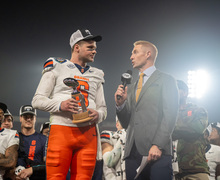Syracuse has shortest forwards in ACC, but that hasn’t stopped the Orange from scoring
Jordan Phelps | Staff Photographer
Syracuse's forwards have an average height of 61.4 inches, the shortest of any team in the Atlantic Coast Conference by three full inches.
When Syracuse lines up for pregame introductions, 5-foot-10 captain Roos Weers leads the walkout line. Directly behind Weers is 6-foot-1 vice-captain Lies Lagerweij. Both playback. Third in line, and Syracuse’s second vice captain, is Emma Tufts. She’s a forward and stands just 5 feet tall.
Down the line, the three next shortest players are also listed as forwards and are all measured at 5-foot-1: Jennifer Bleakney, Caroline Cady and Elaine Carey. Carolin Hoffmann, the tallest of the Orange’s forward, stands 5-foot-4.
“I know our coaches like to recruit fast people to be up front,” Carey said. “And I know typically fast people just somehow end up being pretty short.”
No. 3 Syracuse (7-0, 1-0 Atlantic Coast) has yet to face a group of forwards as short as its own this season, according to heights and first-listed position from each team’s website. And the Orange won’t for the rest of the season. At the position, SU (61.4 inches) is the shortest team in the ACC by about three inches, compared to Boston College (64), North Carolina (64.6), Duke (64.8), Louisville (64.7), Virginia (66.8) and Wake Forest (64.7).
The average measurement of Syracuse’s forwards at 5-foot-1 does not include 5-foot-6 freshman Chiara Gutsche, who does not have a listed position but has been used at times this season as a forward. Still, even if she were to factor in, SU would have the shortest lineup.
Heights do not appear to have factored into the Orange’s recruiting process. When asked about her forwards’ heights, SU head coach Ange Bradley said: “I never really thought of it, quite honestly.”
Syracuse’s forwards have kept Bradley’s focus on the scoreboard by scoring two-thirds, 16 of 24, of the team’s goals this season.
The Syracuse defense also seems unaffected by practicing against shorter teammates in practice, because it has yet to struggle against taller opponents. SU opponents, in 490 minutes, have yet to score a goal this season.
While Syracuse forwards said it’s unclear how much of an advantage is gained by being shorter, it helps Carey complete one of her favorite moves. When she drives toward a taller defender, she tries to slip the ball through the defender’s legs. Carey either succeeds in beating her defender, or, if she’s in the circle and the ball hits the opponent’s foot, SU wins a penalty corner.
“Win-win situation there,” Carey said.
Another potential benefit for Syracuse’s relatively short forwards comes from their stick lengths, Carey said. Although she’s a foot shorter than Lagerweij, Carey said her stick is only about an inch shorter than Lagerweij’s. Carey finds herself running in a more comfortable, upright posture with the ball than a player with a similar stick length who’s much taller.
“I think we can use (our height) to our advantage over maybe taller girls that maybe aren’t as mobile,” Carey said. “There are tall people that are very fast, but in general, the stereotype is that they’re a little less mobile.”
Bradley has never worried about her forwards’ heights and, if they keep scoring the way they have been, she won’t start now.
Published on September 12, 2017 at 11:25 pm
Contact Billy: wmheyen@syr.edu | @Wheyen3





